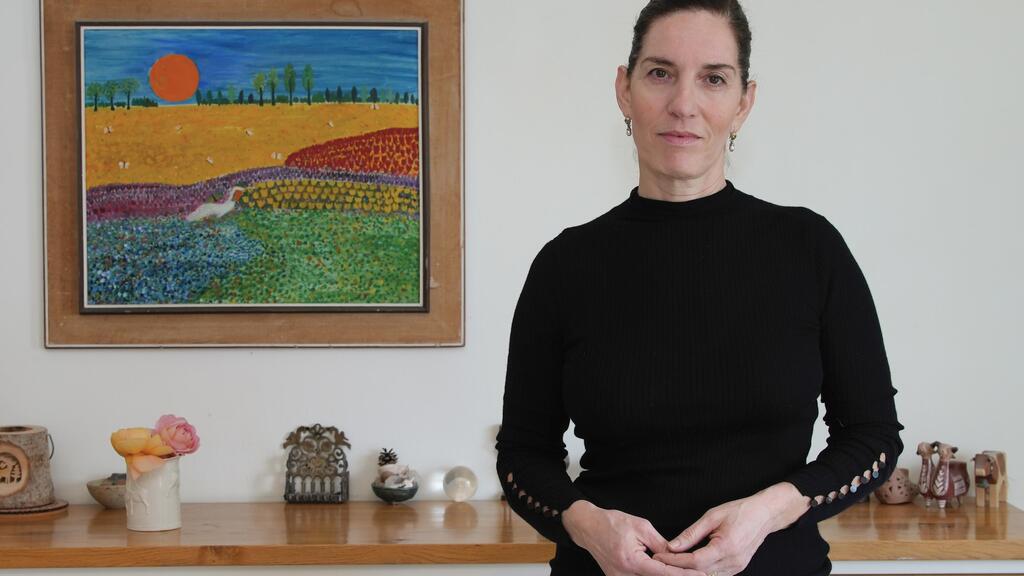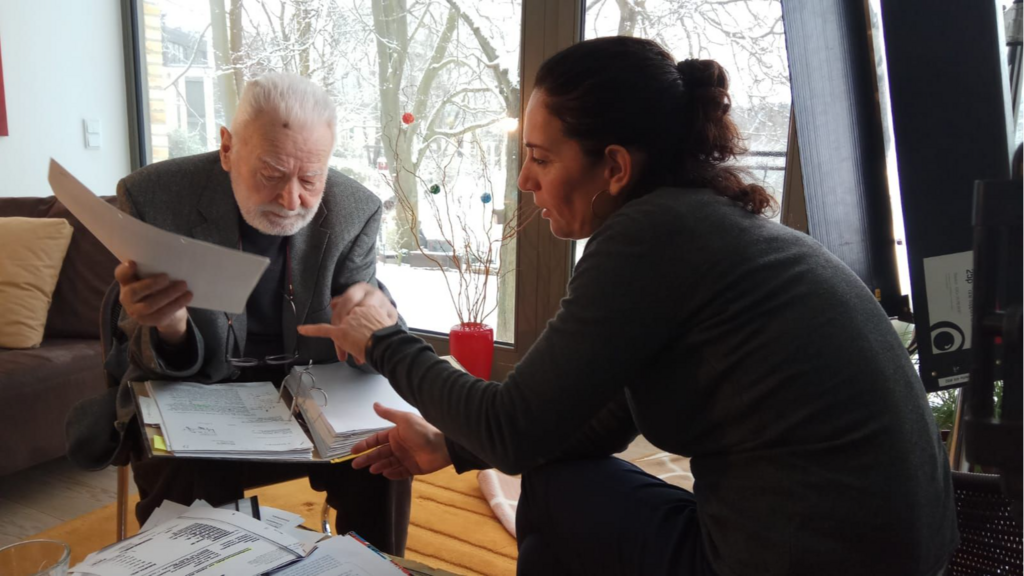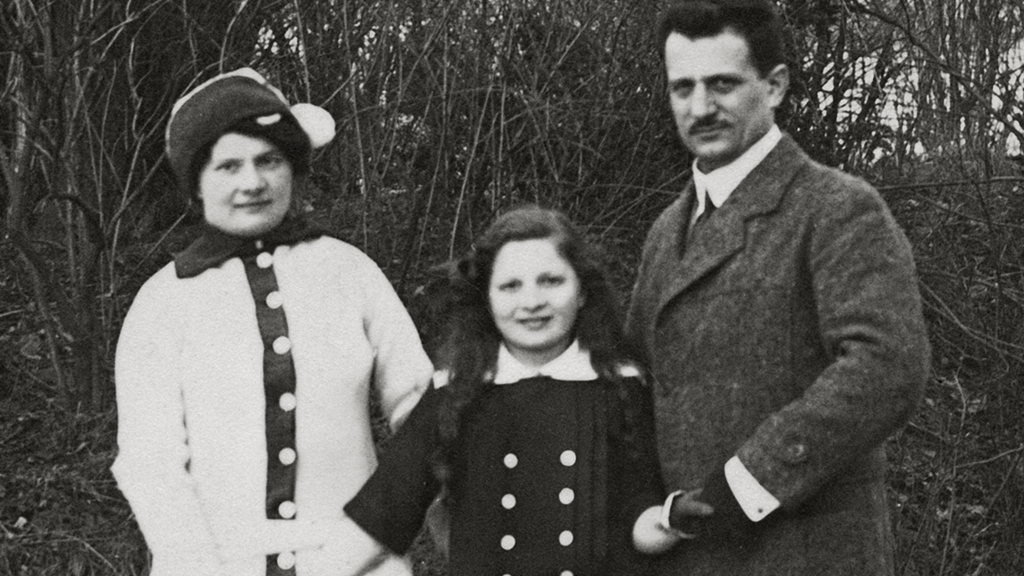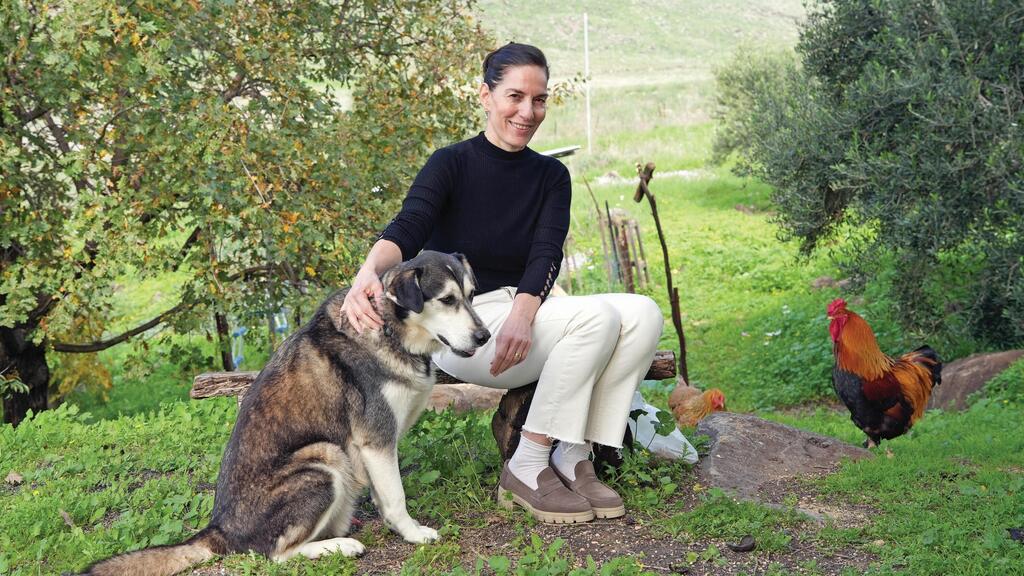Eight years ago, Mooly Landsman received a surprising email from a German lawyer. That's how she learned that her great-grandparents had a rare valuable art collection that was looted by the Nazis. She documented her quest in the film "The European Dream". Did she manage to get the artworks back?
One day in 2016, Mooly Landsman (53), a documentary director from the Karkom community settlement, received a letter from a German lawyer named Fritz Enderlein. This is how she first learned about the collection of rare paintings that were stolen from her great-grandparents during World War II. At that moment, her documentary senses were ignited, resulting in "The European Dream", a film documenting a cross-country journey of Landsman and Roberto Graetz from Argentina, another client of the same lawyer, in search of the stolen artworks of their grandparents.
Landsman's great-grandparents, Julius and Dora Klausner, managed to escape to Switzerland on December 31, 1937, leaving behind a huge property; from there they moved on to Argentina. Their three daughters left Germany even before the Nazis came to power.
Their youngest, Margot, Landsman's grandmother, immigrated to Israel in the 1920s. She assisted in bringing the "Habima" theater to Israel and served as its manager between 1928 and 1936; later she founded the "Herzliya Studios". Landsman documented her grandmother's life in the documentary drama "Saga of a Photo", which started with a picture she found in her grandmother's estate.
Landsman's new film, "The European Dream" (airing these days on HOT8 TV channel and HOTVOD), tells the story of Landsman and Graetz, who meet in Berlin 75 years after that war and search throughout Europe for the lost artworks of their grandfathers - prosperous industrialists who acquired during the years rare art collections, including works by great artists such as Rubens, Bruegel, Landseer, Van Leyden, Van Blumen, Max Liebermann and more.
The German lawyer Enderlein accompanied the two on their parallel journeys, but during the filming he died of a serious illness. Each of them encountered walls of bureaucracy, concealment, and denial, and unfolded a painful story which involved killing and looting as well as the story of their family history that was unknown to them.
Through the eyes of the descendants, who are trying to connect with their roots, we get to know the behind-the-scenes of the art world which is full of struggles, and we learn about the attempts of countries to keep for themselves the looted artworks that were owned by Jews. The Jews played a key role in the establishment of modern art in Germany in the years before WWII as part of the "November Group", of which Roberto's uncle, Hugo Graetz, was one of the founders. After the Nazis came to power, all art associations in Germany were forced to align with the Nazi ideology and stopped cooperating with the group.
"Enderlein's email immediately encouraged me to learn more about my family history, trying to understand what happened to them and also to know where the artworks have gone," explains Landsman. "I replied to his email, 'Let's make a film about the search, and if we don't find the lost paintings, at least we'll have a film.' I also asked him if he had other clients who were looking to reclaim their lost art, so he introduced me to Roberto Graetz. We both arrived in Berlin following Enderlein's email and our paths crossed when we found out that both our grandparents belonged to the same social circles."
Roberto's grandfather, Robert Graetz, was murdered in the Holocaust. Before that he managed to take care of his family, sending them outside of Germany. He divorced his Latvian wife to save her from the clutches of the Nazis, while his son Helmut, Roberto's father, managed to leave at the last minute for America and from there he arrived in Argentina.
What did you hope to find on this journey?
"I wanted to do justice and return the property of my grandparents back to the family. But it was not only a matter of justice, I also wanted to know who they were, how they lived and what they've been through. I feel like King Saul who went searching for the lost donkeys and found a kingdom. I went searching for the artworks and found my roots."
But you didn't find the artworks.
"That's right, I didn't get to find the works, nor to return them, I didn't even get to see them. However, I was able to delve into the world of my great-grandparents, understand how they lived, what they've experienced and felt, and that filled me. This journey had a huge meaning that went beyond the matter of property. On the other hand, Roberto did manage to reclaim two paintings and two wood engravings out of 250 works that were listed in Robert Graetz's collection, which is a lot."
Escaping to Switzerland, and from there to Argentina
Landsman always knew that she was the scion of a wealthy German family, but she didn't know about her grandfather's artwork collection until the day she received the email from the lawyer. Klausner made his fortune when he founded the "Leiser" shoe factory in 1898, when he was 17 years old. Over the years, alongside the factory, he also established a chain of shoe stores in Germany, with branches in the Netherlands and Austria.
When Landsman was a child, she repeatedly heard from her mother Miriam the story of Julius and Dora's escape from Germany, how they managed to evade the Gestapo officers who came one morning to their home on Pazanen Street in Berlin and asked Dora, who opened the door, to accompany them. "She told them that Mr. Julius Klausner was not at home and that the passports were kept in the safe, asking them to come back in the afternoon. The officers were probably shocked by her fluent German and her self-confidence and simply obeyed her," Landsman says. "They turned around and left; within that time-window, the Klausners fled to Switzerland, separately. One traveled by train and the other by plane. After a few months, they managed to move from there to Argentina."
Julius Klausner died in 1950 and was buried in Argentina. "Dora used to travel to Berlin once a year to look after what was left of their business, and during her visit in 1959 she had some kind of nervous breakdown and was hospitalized in a psychiatric hospital," says Landsman. "Three days later, she died, apparently from an overdose of medication. She was buried in Germany, and her eldest daughter Ilze, who lived in Munich at the time, decided to move her father's bones from Argentina and bury him next to her mother. In the years after the war, Julius and Dora managed to reclaim part of their property, even my parents got some, and my grandmother actually founded the Herzliya Studios from the funds she has inherited from her parents."
Landsman was born and raised in Herzliya, and at the age of 14, when her parents lived abroad for a while, she moved to Kibbutz Hulata, where she grew up until the age of 21. Her mother, Miriam, the granddaughter of Julius and Dora, was a psychologist and died 12 years ago. Two years later, her father, Zvi Spielman, one of the first independent film producers in Israel, who produced, among other things, the movie "One of Ours" by the Barbash brothers, also died.
"My father had to travel abroad for a long period of time for a production, and my mother went with my brother to Vienna because he suffered health problems which could only be treated there," she says. "Before that I visited Kibbutz Hulata a lot with my sister who had a good friend there, and we would spend time there on vacations. I fell in love with the kibbutz, which was a complete contrast to Herzliya, the city I lived in. I kept telling my parents that I wanted to move to a kibbutz, and they always disagreed, but when the need arose, they said 'okay'."
She knew her husband Tslil (58), a member of Kibbutz Ayelet-HaShahar near Hulata, since she was a child in the kibbutz. When she started studying at the "Camera Obscura" School of Arts, she met him again and they became a couple. The two have five children: Eden, Shir, Teva, Klil and Libi. Together they produce independent documentary films, and at the same time grow olive groves and produce olive oil in the settlement of Karkom which is located near the Sea of Galilee.
"Tslil and I were very fascinated by the world of documentaries. We graduated in 1995, when the documentary genre's popularity was increasing, and we were quite attracted to it," she says. "Not to mention that the budgets of documentaries are more reasonable, compared to feature films. The film 'The European Dream', for example, was entirely funded by the Galilee Film Project, the Rabinovich Foundation for the Arts, the Claims Conference, the New Fund for Cinema and TV and Hot Communication Company."
Forced auction
The work on the film "The European Dream" took five and a half years, partly because of the continuation of Roberto Graetz's legal action to restore the work 'Calla and Iris' by the artist Max Pechstein to his family's ownership, which was awaiting a verdict. "He found this piece of art and he had proof that his grandfather was the rightful owner, but the work was held in private hands and the person who held it protected himself with the statute of limitations. Roberto went through three courts and reached the German Supreme Court, but to no avail. At the same time, we reached a dead-end regarding the restitution of the artworks of my family, and that was the stage when we decided to end the film."
The film reveals that the Nazis held two auctions in which the property of the Klausner family, which included 14 rare works of art, was sold. "The first, in 1938, was a forced auction and the money was of course transferred to the Gestapo, and the second auction, in 1941, was conducted by the Gestapo itself when the Klausners were already in Argentina," she recounts.
"Of all the artworks that were listed in the catalog produced before the auctions, we were able to get some information of only one work that was sold in 1994 at Christie's auction house in Amsterdam, but its traces disappeared again, because the auction house was not ready to provide us with the information about the person who purchased it. They agreed to send a letter to the buyer and ask him if it was ok that they will pass on his details to us; he replied that he sold the art piece, and that was the end of it. He would not say to whom he sold; and why should he?"
What would you have told him if you knew his identity?
"I would have told him about Julius and Dora, and maybe he would have agreed to at least show me the artwork that had been hanging for years in my great-grandparents' house. They didn't even allow me that, and that's an injustice that the German law today protects the holders of the works rather than the victims."
'Have you killed and also taken possessions?'
Landsman explains that there are two laws that constitute an obstacle when it comes to the restitution of property. "The statute of limitations, which refers to a timeframe of 30 years from the day of the looting, and the rule of client confidentiality, according to which an art dealer is not obligated to reveal the names of his clients. These laws apply to all of Europe, not only to Germany. There are a hundred thousand works of art that have not yet been returned, and soon there will be no one left to return them to. The burden of proof is on the victims, and most of the heirs - if there are any heirs at all - have no proof. The film is intended to provoke discussion on what will be the fate of the artworks that will never have a claimant. I would like the film to bring about a change in the statute of limitations, because this is in fact whitewashing a terrible crime. After all, Robert Graetz was murdered on German soil; isn't it 'have you killed and also taken possessions?'"
However, most holders of the artworks today bought them legally, why should they confront you at all?
"From a moral point of view, they cannot own these works, even if they paid for them and if they bought them in good faith. We need to find solutions: either we sell the artwork, and the proceeds of the sale will be divided equally, or the holder compensates the rightful owner with half of the works' value, or the work will be donated to a museum. Some kind of justice should be done towards me as well."
How disappointed were you when you ended up with nothing?
"It's a bit disappointing, but I've won so much through this journey, so I don't relate to it as disappointment. If one day some artwork suddenly appears, I'll be happy, but I've already won anyway. I got connected to my heritage and roots, there's nothing more fulfilling than that. All these years I said, 'How is it possible that a holocaust took place? It's unimaginable. And now, after October 7, I understand that everything's possible. Not only are people still capable of doing such horrible things to other people, the world around is also still silent."
Who would you like to watch the movie the most?
"I would like it to be screened in the German Bundestag and for all members of the German parliament to watch it, so it will urge them to change the law, as long as there is still someone to reclaim the stolen works of art."





